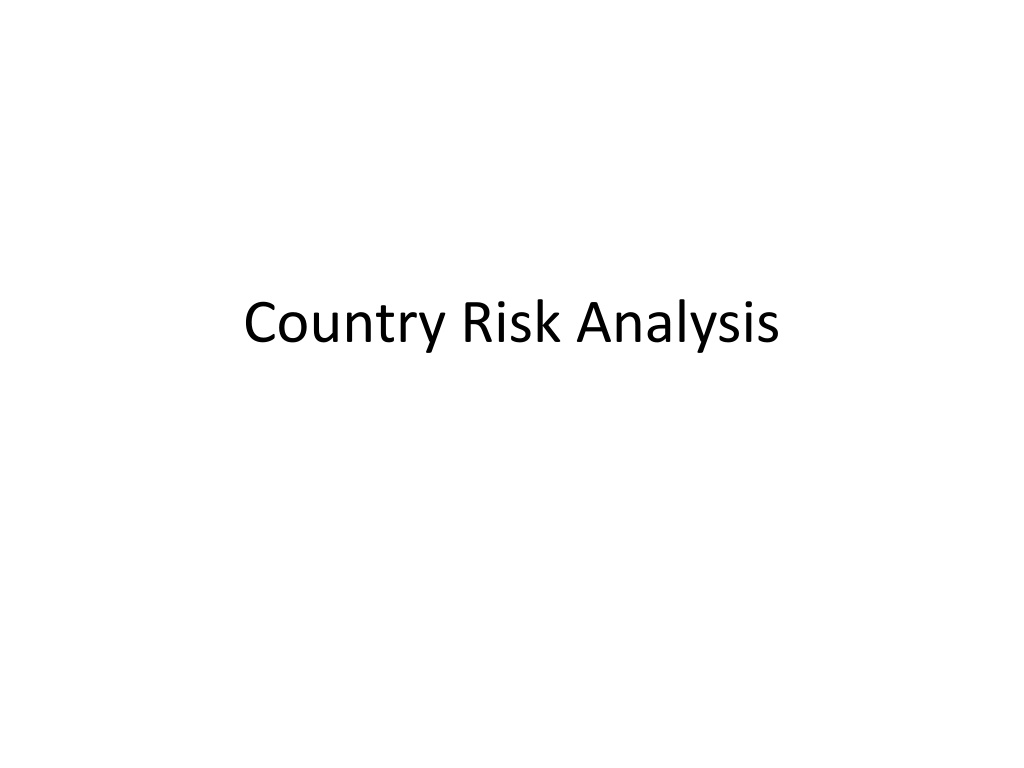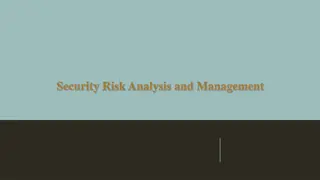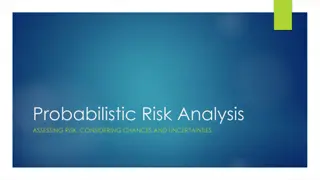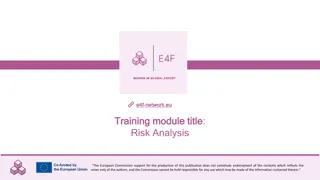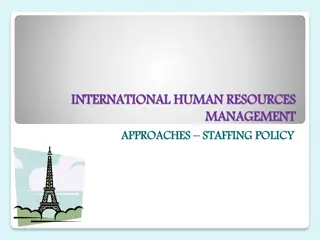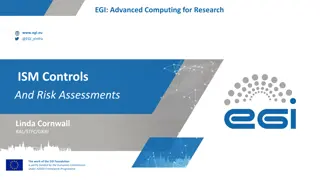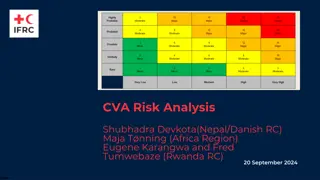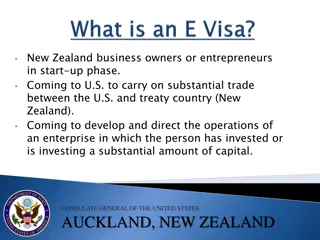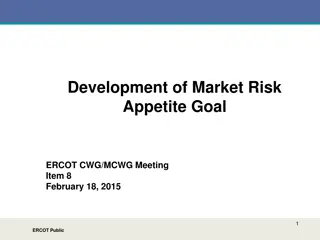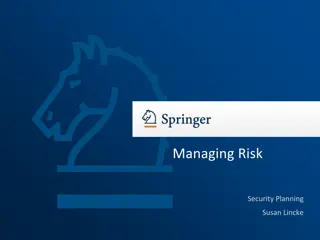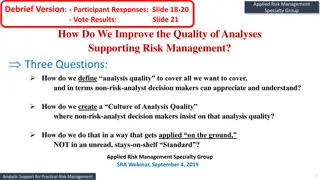Understanding Country Risk Analysis in International Business
Country risk analysis is crucial for multinational corporations (MNCs) to assess the potential impact of a country's environment on their financial outcomes. It includes evaluations of political and economic risks in foreign operations. Sovereign risk, political risk characteristics, and factors are major components of country risk. MNCs conduct country risk analyses to gauge exposure in existing foreign ventures and when considering new investments. Recognizing and managing country risk is essential for financial decision-making and maximizing MNC value.
- Country Risk Analysis
- Multinational Corporations
- Sovereign Risk
- Political Risk
- International Business
Download Presentation

Please find below an Image/Link to download the presentation.
The content on the website is provided AS IS for your information and personal use only. It may not be sold, licensed, or shared on other websites without obtaining consent from the author. Download presentation by click this link. If you encounter any issues during the download, it is possible that the publisher has removed the file from their server.
E N D
Presentation Transcript
Country Risk Country risk involves the potentially adverse impact of a country s environment on an MNC s cash flows. Country risk includes the adverse political and economic risks of operating in a country.
sovereign risk The government defaulting on its bond payments is called sovereign risk . narrower risk associated with a
Example A recession in a country that reduces the revenues of exporters to that nation is a realization of country risk. Labor strikes by a truckers, and transit production and distribution of products, thus lowering profits, also qualify as country risks. Clashes between religious groups that prevent people in a country from shopping can also be considered country risks. country s workers dockworkers, that disrupt
Example We have significant international operations and plan to continue expanding our operations abroad where we have limited operating experience, and this may subject us to increased business and economic risks that could affect our financial results. Facebook We could be subject to economic, political, regulatory and other risks arising operations. from our international Netflix
Country Risk MNCs periodically conduct a country risk analysis to determine the exposure of their existing foreign business operations to country risk. They also conduct a country risk analysis when considering new direct foreign investment. Financial managers must understand how to measure country risk and incorporate country risk within their capital budgeting analysis so that they can make investment maximize their MNC s value. decisions that
Political Risk Characteristics/Factors Political risk can impede the performance of a local subsidiary. An extreme form of political risk is the possibility that the host country will take over a subsidiary. In some cases of expropriation, compensation (in an amount determined by the host country government) is awarded. In other cases, the assets compensation is provided. are confiscated and no Expropriation can take place peacefully or by force. The following are some of the more common characteristics of political risk:
Political Risk Characteristics/Factors Expropriation or Nationalization Attitude of consumers in the host country Actions of host government Blockage of fund transfers Currency inconvertibility War Inefficient bureaucracy and Corruption
Contract Repudiation Taxes and Regulation Exchange Controls Corruption and Legal Inefficiency
Expropriation or Nationalization The most extreme form of political risk is the possibility that the host country takes over an MNC s subsidiary, with or without compensation. This is the worst-case scenario for firms.
Attitude of Consumers in the Host Country A mild form of political risk (to an exporter) is the tendency of residents to purchase only locally produced products. Even if the exporter decides to set up a subsidiary in the foreign country, that tendency could prevent its success. Country governments commonly encourage local consumers to purchase from locally owned manufacturers. An MNC that considers entering a foreign market (or has already entered that market) must monitor the general attitude of consumers products. If consumers are very loyal to local products, then a joint venture with a local company may be more feasible than an exporting strategy. toward locally produced
Actions of Host Government Various actions of the host government can affect an MNC s cash flow. A host government might impose pollution control standards (which affect costs) and additional corporate taxes (which affect after-tax earnings) as well as withholding taxes and fund transfer restrictions (which affect after-tax cash flows sent to the parent).
Example When Facebook went public in 2012, its registration statement disclosed its exposure to political risk as follows: It is possible that governments of one of more countries may seek to censor content available on Facebook in their country, restrict access to Facebook from their country entirely, or impose other restrictions that may affect the accessibility in their country . In the event that access to Facebook is restricted, we may not be able to maintain or grow our revenue as anticipated and our financial results could be adversely affected.
Actions of Host Government In 2014, Russia announced that it had temporarily closed four McDonald s restaurants due to health and safety violations. The closures may have been prompted by the U.S. sanctions that were imposed on Russia as a result of Russia s conflict with Ukraine. Surveys of executives of U.S.-based MNCs doing business in Russia at the time found that they were concerned that their Russian subsidiaries might be subjected to restrictions by the Russian government as a form of retaliation against the U.S. government.
Blockage of Fund Transfers Subsidiaries of MNCs often send funds back to headquarters to repay loans, purchase supplies, pay administrative fees, remit earnings, or other purposes. In some cases, a host government may block fund transfers, which could force subsidiaries to undertake projects in the host country that are not optimal (just to make use of the funds). Alternatively, the MNC may invest the funds in local securities that provide some return while the funds are blocked. But this return may be inferior to what could have been earned on funds remitted to the parent.
Currency Inconvertibility Some governments do not allow the home currency to be exchanged into other currencies. Thus the earnings generated by a subsidiary in these countries cannot be remitted to the parent through currency conversion. When the currency is inconvertible, an MNC s parent may need to spend it in the host country.
War Some countries tend to engage in conflicts with neighboring countries or to experience internal turmoil. This can affect the safety of employees hired by an MNC s subsidiary or by salespeople who attempt to establish export markets for the MNC. In addition, countries plagued by the threat of war typically have volatile business cycles, which make cash flows generated from such countries more uncertain. Multinational corporations in all countries have some exposure to terrorist attacks, but this exposure is much higher in certain countries than in others. Even if an MNC is not directly damaged due to a war, it may incur costs from ensuring the safety of its employees. If a country s risk of war is high, MNCs do not need to analyze the feasibility of the proposed project any further.
War Significant MNC losses can occur due to internal civil strife or wars. In war-torn regions across the world, companies often hire their own private armies in order to try to function normally. For example, piracy near the Somali coast has prompted some companies to hire private security firms to protect their ships. This, of course, is expensive and raises thorny legal and humanitarian issues.
Inefficient Government Bureaucracy An inefficient government bureaucracy can delay an MNC s efforts to establish a new subsidiary or expand business in a country. In general, bureaucracy is a bigger problem in some emerging countries. The problem is commonly caused by a lack of government organization, so the development of a new business is delayed until various applications are approved by different sections of the bureaucracy. Delays can also be caused by government employees who expect gifts before they will approve an MNC s applications.
Corruption Highly inefficient governments with large bureaucracies can increase a company s costs of doing business. Governments may also be corrupt and demand bribes. Corruption can adversely affect an MNC s international business because it can increase the cost of conducting business or reduce revenue. Various forms of corruption can occur at the firm level or as a result of relationships between firms and government agencies. For example, an MNC may lose revenue because a government contract is awarded to a local firm that paid off a government official. Laws defining corruption and their enforcement vary among countries.
Contract Repudiation Governments sometimes revoke, or repudiate, contracts without compensating companies investments in projects or services. Governments default on the payments associated with the contracts, cancel licenses, or otherwise introduce laws and regulations that interfere with the contracts to which the government and the MNC agreed. In 2010, Pakistani authorities halted all operations of the $3 billion Reko Diq copper and gold project, led by Canada s Barrick Gold and Chile s Antofagasta, citing that the contract substantially undervalued the value of the project. for their existing
Taxes and Regulation Governments can dramatically change the rules of the game that were in place when an MNC first made its investment in the host country. Examples include unexpected increases in taxes, restrictions on hiring and firing local workers, and sudden stricter environmental standards. Some industries may be more susceptible than others, especially if the foreign corporation is dominating its local competition. MNCs are also sometimes forced by governments to sell their equity stakes in local subsidiaries because of foreign ownership restrictions.
Taxes and Regulation Regulations that MNCs find particularly problematic are regulations restricting the transfer of their profits earned abroad back to their home countries. Governments not only have the power to change the tax rates on these earnings, but they can also completely block their transfer. This essentially forces the MNC to invest its funds locally, even if doing so is less profitable. Finally, governments often make decisions that can indirectly affect the cash flows of MNCs.
Example In 2010, Chile, the world s main copper producer, increased royalty rates on copper producers changing to a progressive tax from 5% to 14% rather than a flat 5% tax.
Exchange Controls Another political risk factor relates to exchange controls. Governments have been known to prevent the conversion of their local currencies to foreign currencies. In general, doing business in countries with inconvertible currencies puts an MNC at considerable risk. An interesting case is the 2002 collapse of the Argentine currency board, which effectively ended the one-for-one convertibility of pesos into government also curtailed bank deposit withdrawals and prohibited the unauthorized export of foreign currency from the country. dollars. The Argentine
Financial Risk Characteristics Along characteristics should be considered when assessing country risk. Financial characteristics can have a strong impact on international projects that MNCs have proposed or implemented. with political characteristics, financial
Economic Growth The most obvious financial characteristic is the current and potential state of the country s economy. An MNC that exports to a country or develops a subsidiary there is naturally concerned about that country s demand for its products, which is influenced by the country s economy. A recession could severely reduce demand for the MNC s exports or for products sold by the MNC s local subsidiary. A country s economic growth is influenced by interest rates, exchange rates, and inflation.
Economic Growth Interest rates. Higher interest rates tend to slow the growth of an economy and reduce demand for the MNC s products. Governments commonly attempt to maintain low interest rates when they want to stimulate the economy. Low interest rates can encourage more borrowing by firms and consumers and thus can result in more spending. Exchange rates. Exchange rates can influence the demand for the country s exports, which affects the country s production and income level. A strong currency may reduce demand for the country s exports, increase the volume of products imported by the country, and therefore reduce the country s production and national income.
Economic Growth Inflation. Inflation can affect consumers purchasing power and their demand for an MNC s products. In addition, it affects the expenses associated with operations in the country. Inflation may also influence a country s financial condition by affecting the country s interest rates and currency value.
Economic Growth A country s financial risk characteristics are strongly influenced by the government s fiscal policy. Some countries use expansionary fiscal policies that involve massive spending and low taxes in order to stimulate their economy. However, this type of policy results in a large national budget deficit and therefore increases the amount of funds borrowed by the government. An expansionary fiscal policy can have long-term adverse effects if the level of government borrowing is so high that it causes concerns about the government s ability to repay its loans.
Example During the 2008 2015 period, the government of Greece continued to pay generous salaries and pensions to government employees, and it spent much more money than it received in taxes. The government finally had to take actions to correct its debt problems so that it could obtain new loans from creditors. To reduce its budget deficit, the government was forced to reduce its spending and to raise taxes, which adversely affected the economy. Many MNCs did not pursue new business recognized that economic conditions might be weak and that corporate tax rates might be increased to pay for the huge budget deficit in Greece because they
Macro-assessment of country risk A macro-assessment of country risk is an overall risk assessment of a country and involves consideration of all variables that affect country risk except those that are unique to a particular firm or industry. This type of assessment is convenient because it remains the same for a given country regardless of the firm or industry of concern; however, it excludes relevant information that could improve the assessment s accuracy. A macro assessment of country risk serves as a foundation that can be modified to reflect the particular business of the MNC, as explained next.
Macro-assessment of country risk A micro-assessment of country risk involves the assessment of a country as it relates to the MNC s type of business. It is used to determine how the country risk relates to the specific MNC. The specific impact of a particular form of country risk can affect MNCs in different ways, which is why a micro- assessment of country risk is needed.
Techniques for Assessing Country Risk Once a firm identifies all the macro- and micro-factors that deserve consideration assessment, it may wish to implement a system for evaluating these factors and determining a country risk rating. Various techniques are available to achieve this objective. Among the most popular techniques are the following: Checklist approach, Delphi technique, Quantitative analysis, Inspection visits, and A combination of techniques in the country risk
Checklist Approach A checklist approach involves making a judgment on all the political and financial factors (both macro and micro) that contribute to a firm s assessment of country risk. Ratings are assigned to a list of various financial and political factors, and these ratings are then consolidated to derive an overall assessment of country risk. Some factors (such as real GDP growth) can be measured from available data, whereas others (such as probability of entering a war) must be subjectively measured.
Checklist Approach A substantial amount of information about countries is available on the Internet. This information can be used to develop ratings of various factors used to assess country risk. The factors are then converted to a numerical rating in order to assess a particular country. Those factors thought to have a greater influence on country risk should be assigned greater weights. Both the measurement of some factors and the weighting scheme implemented are subjective.
Delphi Technique The Delphi technique involves the collection of independent opinions without group discussion. As applied to country risk analysis, the MNC could survey specific employees or outside consultants who have some expertise in assessing a given country s risk characteristics. After the MNC receives responses from its survey, it attempts to determine some consensus opinions (without attaching names to any of the opinions) about the country s perceived risk. The firm then sends this summary of the survey back to the survey respondents and asks for additional feedback regarding its summary of the country s risk.
Inspection Visits Inspection visits involve traveling to a country and meeting with government officials, business executives, and/or consumers. Such meetings can help clarify any uncertain opinions the firm has about a country. Indeed, some variables (such as intercountry relationships) may be difficult to assess without a trip to the host country.
Combination of Techniques Many MNCs do not have a formal method to assess country risk, because there is no proven method that is always most appropriate. Consequently, many MNCs use a combination of techniques to assess country risk.
Incorporating Risk in Capital Budgeting When MNCs assess the feasibility of a proposed project, country risk can be incorporated in the capital budgeting analysis by adjusting the discount rate or by adjusting the estimated cash flows. Each method is discussed here.
Adjustment of the Discount Rate The discount rate of a proposed project is supposed to reflect the required rate of return on that project. Thus the discount rate can be adjusted to account for the country risk. The lower the country risk rating, the higher the perceived risk and the higher the discount rate applied to the project s cash flows. This approach is convenient in that one adjustment to the capital budgeting analysis can capture country risk. However, there is no precise formula for adjusting the discount rate to incorporate country risk. The adjustment is somewhat arbitrary and may therefore cause feasible projects to be rejected or infeasible projects to be accepted.
Adjustment of the Estimated Cash Flows Perhaps the most appropriate method for incorporating forms of country risk in a capital budgeting analysis is to estimate how the cash flows would be affected by each form of country risk. For example, if there is a 20 percent probability that the host government will temporarily block funds from the subsidiary to the parent, the MNC should estimate the project s net present value (NPV) under these circumstances, realizing that there is a 20 percent chance that this NPV will occur.
If there is a chance that a host government will impose higher taxes on the subsidiary, then the foreign project s NPV to the MNC should be estimated under these conditions. Each possible form of risk has an estimated effect on the foreign project s cash flows and therefore on the project s NPV. By analyzing each possible effect, the MNC can determine the probability distribution of NPVs for the project. Its accept/reject decision on the project will be based on its assessment of the probability that the project will generate a positive NPV and of the size of possible NPV outcomes.
Accounting for Uncertainty Although MNCs cannot anticipate all changes in country risk conditions that may happen, they should at least consider various scenarios that might occur, especially when considering a long-term project in a foreign country. In the previous example, the initial assumptions for most input variables were used as if they were known with certainty. However, Spartan, Inc., could account for the uncertainty of country risk characteristics while also allowing for uncertainty in the other variables as well. This process is facilitated by performing the analysis with the aid of a computer spreadsheet.
